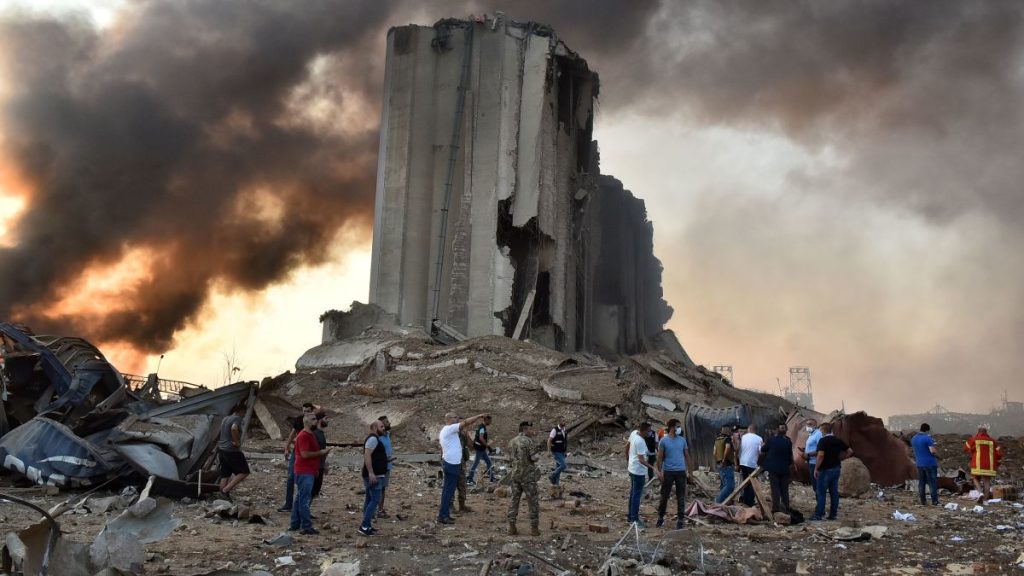Beirut’s port blast two years on: An open wound festers as authorities try to close the case

It was 6:07 pm. Thousands of lives were upended and the Lebanese capital — no stranger to disaster — was transformed into a hellscape. Much like the broken clocks, the catastrophe appears to have been suspended in time. Thursday marks two years since the port explosion. Yet the city’s hardest hit, eastern neighborhoods still The authorities’ playbook has been similar in its response to the 2020 port blast, which remains the single most deadly explosion in Lebanon’s modern history, causing material and physical casualties as far as 12 kilometers (7.5 miles) away. In the intervening years, the government has repeatedly blocked aBeirut’s wheat silos are many things at once. They stand as a towering tombstone to a bygone era. The smoldering structure also seems to fester like the open wound of the city’s collective memory. And importantly to relatives of the victims, it marks the scene of a crime, a looming mass that serves as a reminder of the quest for accountability. Since the explosion, Lebanon’s financial tailspin, which began in October 2019, has continued. The country is in the throes of a bread crisis, in part because of the fallout from Russia’s invasion of Ukraine, but also due to Lebanon’s infrastructural and financial decay. Its economic woes — inflation, ballooning unemployment, mass poverty — continue unabated. But for many, the successive crises have not overshadowed the memories of the Beirut port blast: the shattered glass that crunched underfoot for weeks afterward; the scenes of overflowing hospital wards; those who perished and those who barely survived. For those seeking justice, the events of 6:07 pm on August 4, 2020 must continue to reverberate until the people responsible are held to account. The digest Israel’s Lapid makes rare allusion to country’s nuclear weapons arsenal Israel’s Prime Minister made a rare allusion in a speech on Monday to the country’s widely suspected nuclear arsenal. Background: Appearing at an event to mark a change of leadership at the country’s Atomic Energy Commission, Yair Lapid spoke of Israel’s defensive and offensive capabilities, as well as what he called its “other capabilities” — understood to be a reference to nuclear weapons. “The operational arena in the invisible dome above us is built on defensive capabilities and offensive capabilities, and what the foreign media tends to call ‘other capabilities.’ These other capabilities keep us alive and will keep us alive so long as we and our children are here,” Lapid said. Why it matters: Israel is widely believed to possess a few hundred nuclear weapons, having developed the technology in the 1960s. Unlike most assumed nuclear weapons states, Israel has never formally declared possession. Instead, it pursues a policy of ‘opacity’ — meaning Israeli leaders, when pushed, have preferred to make only oblique or ambiguous reference to nukes. Yemen’s warring sides renew truce for two more months Yemen’s warring parties agreed on Tuesday to renew a two-month truce, UN Special Envoy for Yemen Hans Grundberg said in a statement. The rival parties agreed to extend the truce for an additional two months. Background: “I am pleased to announce that the parties have agreed to extend the truce, under the same terms, for an additional two months, from 2 August 2022 until 2 October 2022,” said Grundberg in a statement, adding that the extension includes commitment to “intensify negotiations to reach an expanded truce agreement as soon as possible.” Why it matters: Yemen’s Iran-backed Houthis and the Saudi-led coalition have been at war for the past seven years, but on April 2 agreed to a two-month truce brokered by the United Nations, which was set to expire on Tuesday. Rival parties are yet to agree on a permanent ceasefire. Biden admin approves potential multibillion dollar arms sales to Saudi Arabia, UAE The Biden administration on Tuesday approved and notified Congress of possible multi-billion-dollar weapons sales to Saudi Arabia and the United Arab Emirates. Background: The US State Department has approved a possible sale of PATRIOT MIM-104E Guidance Enhanced Missile-Tactical Ballistic Missiles (GEM-T) and related equipment to Saudi Arabia for an estimated $3.05 billion. The US government also approved the potential sale of “Terminal High Altitude Area Defense (THAAD) System Missiles, THAAD Fire Control and Communication Stations, and related equipment for an estimated cost of $2.245 billion” to the UAE. Why it matters: The notice of the approval comes just weeks after President Joe Biden met with the leaders of the UAE and Saudi Arabia in the Saudi city of Jeddah last month. It also comes amid US efforts to drive the oil-rich countries to increase oil production, and as allies in the Gulf express concern over what is perceived as a waning US security presence in the region. The approval was also notified on the same day that the United Nations announced a two-month extension of the truce in Yemen. Number of the day $704 million Egypt’s Suez Canal in July recorded $704 million in revenues, its highest ever monthly revenue, according to a statement by the Suez Canal Authority (SCA) on Tuesday. The record figure is up 32.4% from the same month last year, added the SCA. What’s trending Algeria: #BRICS Algeria President Abdelmadjid Tebboune has said he is interested in joining BRICS, a grouping of emerging economies comprising Brazil, Russia, India, China, and South Africa. Tebboune said his country meets the conditions of joining the group. The hashtag was trending in Algeria with most users welcoming the initiative. One wrote of the news that it will “make our voice even more audible.” Some users were guessing what the new name of the group will be as it is formed of the first letter of each member country, one writing: “Algeria wants to join BRICS… BRICSA?” Kuwait: #Memory_of_Iraq’s_brutal_invasion “The memory of Iraq’s brutal invasion” was the number one trend in Kuwait this week as users shared old speeches from Kuwait’s then Emir Jaber Al-Sabbah and videos of his return from exile in March of 1991. On August 2, 1990, Iraq invaded oil-rich Kuwait in an apparent bid to pay off debts racked up by the country’s eight-year war with Iran. The invasion was the first domino to topple in lead up of the 1990-91 Persian Gulf war. Jordan: #Jordan_is_not_okay The number one hashtag in Jordan this week, #Jordan_is_not_okay, was triggered by a parliament decision to raise MPs’ monthly salaries by 200 Jordanian Dinars ($282). The Parliament has defended the decision as compensation for fuel price hikes. Twitter users were up in arms. One wrote: “A parliament member whose salary is over 3000 JD ($4230) receives a fuel stipend but the people of Jordan with a salary between 400 and 450 JDs get nothing… I understand nothing.” Another user tweeted a graphic of a cheese block shaped like Jordan being eaten by rats, captioned “this is how I see Jordan…” By Mohammed Abdelbary Photo of the day




